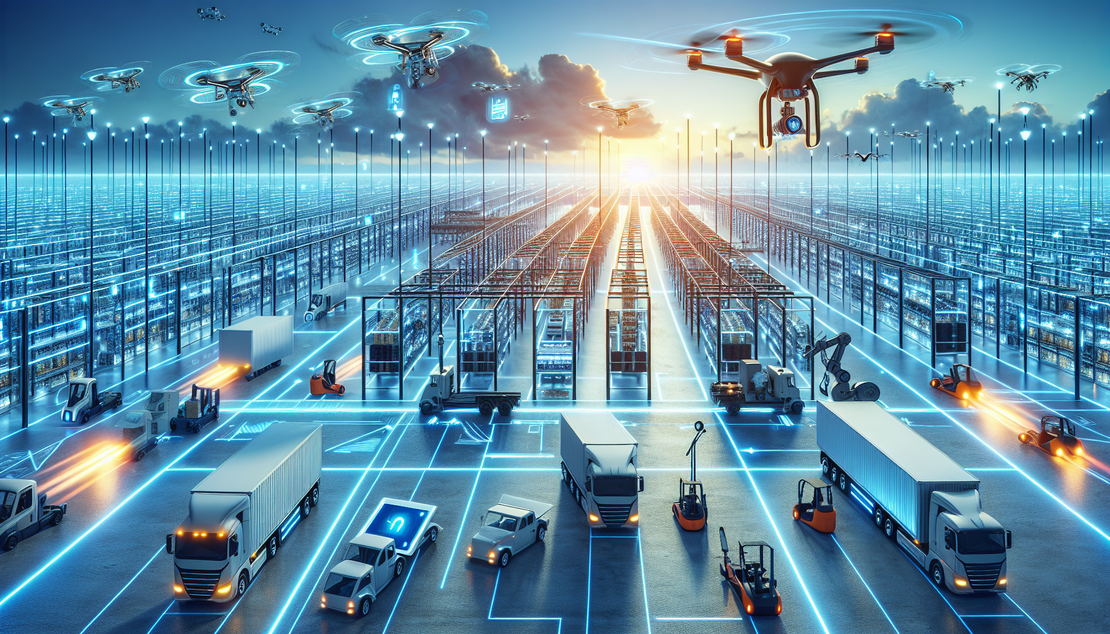
5 Ways AI Can Transform Your Supply Chain Management
- Rajdeep Barad
- Ai , Supply chain management , Inventory management , Warehouse automation
- February 22, 2025
Revolutionizing Supply Chains: The Power of AI in Supply Chain Management
The Importance of AI in Supply Chain Management
AI, or Artificial Intelligence, is reshaping the landscape of supply chain management. Let’s delve into how AI can revolutionize supply chains:
AI can optimize inventory management: By leveraging AI algorithms, supply chain managers can predict demand more accurately, minimize excess inventory, and ensure products are available when needed, reducing stockouts.
Pro Tip: Utilize AI-powered demand forecasting tools that consider historical data, market trends, and external factors for more precise inventory planning.
AI improves demand forecasting accuracy: AI algorithms can analyze vast amounts of data to predict demand patterns with higher accuracy, helping businesses optimize inventory levels and reduce holding costs.
Pro Tip: Combine AI-driven demand forecasting with machine learning models to continuously refine and improve demand predictions based on real-time data inputs.
AI enhances supply chain visibility: Through AI-powered tools, businesses can gain real-time insights into their entire supply chain, allowing for better decision-making, risk mitigation, and proactive issue resolution.
Pro Tip: Implement AI-driven supply chain visibility platforms to track shipments, monitor supplier performance, and identify bottlenecks in real-time for improved efficiency.
AI enables real-time data analysis: AI algorithms can process vast amounts of supply chain data swiftly, providing actionable insights for optimizing processes, reducing lead times, and enhancing overall operational efficiency.
Pro Tip: Integrate AI analytics tools to monitor key performance indicators (KPIs), detect anomalies, and automate corrective actions, leading to more agile and data-driven decision-making.
AI reduces operational costs: By automating repetitive tasks, optimizing processes, and mitigating risks, AI can help businesses cut down operational costs, improve resource utilization, and drive profitability.
Pro Tip: Employ AI-driven cost optimization algorithms to identify inefficiencies, negotiate better terms with suppliers, and optimize supply chain operations to achieve cost savings.
Enhancing Efficiency with AI in Supply Chain Management
Efficiency is the cornerstone of a well-functioning supply chain. Here’s how AI can supercharge efficiency:
Streamlining procurement processes: AI can analyze supplier performance, market dynamics, and cost structures to streamline procurement processes, enhance supplier relationships, and drive cost savings.
Pro Tip: Implement AI-based procurement platforms that automate supplier selection, contract management, and purchase order processing, enabling faster decision-making and reducing procurement cycle times.
Automating warehouse operations: AI-powered robots and drones can automate inventory management, picking, packing, and shipping tasks, improving warehouse efficiency, reducing errors, and accelerating order fulfillment.
Pro Tip: Deploy AI-driven warehouse management systems equipped with robotic automation and computer vision technologies to optimize inventory storage, increase picking accuracy, and boost overall warehouse productivity.
Optimizing transportation routes: AI can analyze historical traffic data, weather conditions, and order volumes to optimize delivery routes, reduce transportation costs, and ensure timely deliveries.
Pro Tip: Leverage AI algorithms for route optimization to minimize fuel consumption, lower carbon emissions, and enhance delivery speed by factoring in variables like traffic patterns and road conditions.
Predictive maintenance for machinery: AI can predict equipment failures before they occur, enabling proactive maintenance scheduling, reducing downtime, and extending the lifespan of machinery and vehicles.
Pro Tip: Implement AI-powered predictive maintenance systems that use machine learning algorithms to analyze equipment sensor data, detect anomalies, and schedule maintenance tasks based on predictive failure models.
Enhancing order fulfillment processes: AI can optimize order prioritization, inventory allocation, and shipping methods to enhance order fulfillment efficiency, improve customer satisfaction, and increase order accuracy.
Pro Tip: Integrate AI-driven order management systems that prioritize orders based on customer preferences, inventory availability, and shipping constraints to streamline order fulfillment processes and provide a seamless customer experience.
Implementing AI Technologies in Supply Chain Management
Adopting AI technologies is key to unlocking the full potential of your supply chain. Here are some essential AI technologies to consider:
RFID technology for tracking inventory: RFID tags and readers can track inventory in real-time, providing accurate visibility into stock levels, reducing stockouts, and enhancing inventory management efficiency.
Pro Tip: Integrate RFID technology with AI-powered inventory management systems to automate inventory tracking, improve inventory accuracy, and enable real-time inventory visibility across the supply chain.
AI-powered predictive analytics tools: Predictive analytics solutions powered by AI can forecast demand, identify trends, and optimize supply chain operations through data-driven insights and actionable recommendations.
Pro Tip: Leverage AI-driven predictive analytics tools to analyze historical data, predict future demand, optimize inventory levels, and improve decision-making processes for enhanced supply chain performance and profitability.
Autonomous vehicles for transportation: Self-driving vehicles equipped with AI technologies can improve transportation efficiency, reduce delivery lead times, and enhance safety in logistics operations.
Pro Tip: Pilot autonomous vehicle technologies for last-mile delivery or inter-site transportation to experience benefits such as reduced delivery costs, increased delivery speed, and enhanced operational safety through AI-driven route optimization and vehicle automation.
Robotics for warehouse automation: AI-driven robotic systems can automate repetitive warehouse tasks, such as picking, packing, and sorting, to increase operational efficiency, reduce errors, and scale warehouse operations.
Pro Tip: Implement AI-enabled robotic automation solutions with machine learning capabilities to adapt to changing warehouse environments, improve picking accuracy, and optimize warehouse layout for maximum efficiency and productivity.
AI-enabled chatbots for customer service: AI-powered chatbots can handle customer inquiries, provide order status updates, and offer personalized assistance, enhancing customer service efficiency and satisfaction.
Pro Tip: Deploy AI chatbots integrated with supply chain management systems to provide customers with real-time order updates, respond to common inquiries, and offer proactive support, improving customer service interactions and driving customer loyalty.
Overcoming Challenges in Adopting AI in Supply Chain Management
While the benefits of AI in supply chain management are immense, there are challenges to navigate. Here’s how to overcome them:
Integration with existing systems: Ensure seamless integration of AI technologies with existing IT systems, such as ERP and CRM platforms, to extract maximum value and drive operational efficiency.
Pro Tip: Collaborate with IT experts and AI solution providers to develop a phased integration plan, conduct thorough testing, and provide training to employees to ensure a smooth transition to AI-powered supply chain systems.
Data security and privacy concerns: Address data security risks by implementing robust cybersecurity measures, data encryption protocols, and access controls to safeguard sensitive supply chain data from cyber threats.
Pro Tip: Partner with cybersecurity professionals to conduct regular security audits, educate employees on data protection best practices, and comply with data privacy regulations to secure AI-driven supply chain systems and prevent data breaches.
Employee training and upskilling: Invest in training programs to upskill employees on AI technologies, data analytics, and supply chain automation to empower them with the knowledge and skills necessary to leverage AI tools effectively.
Pro Tip: Provide hands-on training sessions, workshops, and online courses on AI fundamentals, machine learning algorithms, and data analytics tools to equip employees with the expertise needed to harness the full potential of AI in supply chain management.
Initial investment costs: Develop a comprehensive business case outlining the ROI of AI implementation, including cost savings, efficiency gains, and competitive advantages, to secure buy-in from stakeholders and allocate resources effectively.
Pro Tip: Conduct a cost-benefit analysis to quantify the value proposition of AI adoption in terms of operational improvements, revenue growth, and strategic impact, showcasing the long-term benefits of investing in AI technologies for supply chain optimization.
Ensuring AI aligns with business goals: Align AI initiatives with strategic business objectives, such as enhancing customer satisfaction, reducing time-to-market, and improving supply chain resilience, to drive tangible business outcomes and achieve sustainable competitive advantage.
Pro Tip: Define clear KPIs, performance metrics, and success criteria for AI projects, regularly monitor progress, solicit feedback from stakeholders, and adjust AI strategies as needed to ensure that AI investments align with business goals and deliver measurable results.
Case Studies: Successful AI Integration in Supply Chain Management
Real-world examples demonstrate the transformative impact of AI on supply chain management. Here are some notable case studies:
Amazon’s use of AI in delivery optimization: Amazon leverages AI algorithms to optimize delivery routes, enhance package tracking, and predict customer preferences, enabling faster deliveries and superior customer experiences.
Walmart’s implementation of AI for demand forecasting: Walmart utilizes AI-powered demand forecasting tools to analyze customer data, trends, and seasonality patterns, optimizing inventory management, reducing stockouts, and improving sales forecasting accuracy.
DHL’s utilization of AI for route optimization: DHL leverages AI algorithms to optimize transportation routes, reduce fuel consumption, and improve delivery efficiency, resulting in cost savings, environmental benefits, and enhanced service quality.
IBM’s application of AI in inventory management: IBM leverages AI-driven inventory optimization solutions to predict demand, automate replenishment, and optimize stock levels, enabling better inventory management practices and enhancing supply chain performance.
Zara’s use of AI for agile manufacturing processes: Zara employs AI technologies to analyze consumer preferences, optimize production schedules, and streamline manufacturing processes, allowing for faster product design iterations, reduced lead times, and increased production efficiency.
Ready to transform your digital vision?
Get in touch with us to explore how our cutting-edge solutions can elevate your business to new heights. Contact us today!
Get in Touch


